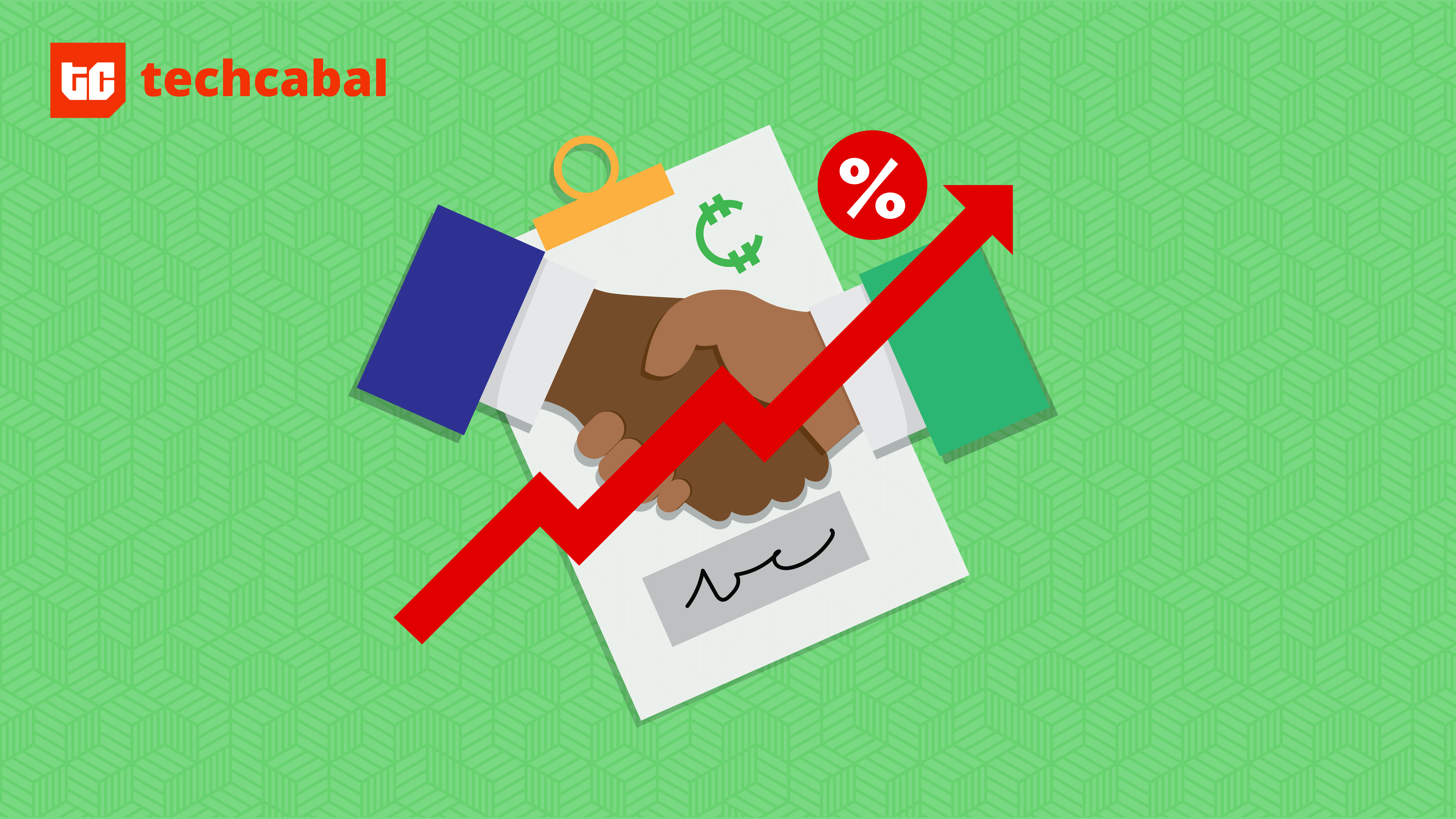Equity funding has typically been the go-to for African startups looking to raise capital. Due to the infancy of startups seeking funding, equity rounds—where founders trade capital for a piece of the company—were the norm. However, as the ecosystem matures and lender confidence increases, debt funding—which requires repayment at an agreed-upon date with interest—has become a more attractive financing option for startups.
According to Partech, African startups raised $1.55 billion in debt funding in 71 deals with 85 unique debt investors in 2022, doubling the amount they raised in 2021. A lot of startups have either grown to the stage they can confidently take on debt or their business model requires them to take on debt early.
Capital-intensive sectors like fintech (45%) and cleantech (39%) accounted for 84% of debt funding last year. Some of the biggest debt deals went to fintechs that operate in the consumer lending sub-sector like Moove, a mobility-focused fintech which raised almost $200 million in debt, and MNT-Halan, an Egyptian microfinance lending and payments startup which raised $150 million in debt. Environmentally-friendly impact cleantechs like d.light and Sunking also raised mega deals.
According to Tidjane Dème, a general partner at Partech, fintech’s growing demand for debt can be attributed to startups in the sector reaching a stage where their working capital needs cannot be financed by venture capital (VC). He also shared that cleantech startups required financing for equipment and infrastructure, something that VC firms did not have the appetite for.
Debt has become a solid alternative source of capital for African technology startups. Last year, even more founders turned to debt as an economic slowdown made equity funding harder to access. With borrowing costs now set to rise in an era of high global interest rates, where does that leave startups?
Global inflation
We cannot talk about rising interest rates without first mentioning the global inflation rate. According to data, global inflation is estimated to have reached 8.75% in 2022—the highest annual increase in inflation since 1996. To curb this inflation, central banks around the world have raised interest rates.
Higher interest rates mean that the cost of borrowing money will increase, and according to economic principles, demand for debt will slow down. If buyers cannot afford goods and services and borrowing becomes too expensive, their demand will drop, and sellers will have to reduce prices to acquire customers, thereby stemming inflation.
The Federal Reserve Bank, the U.S. apex bank, has raised interest rates nine times since March 2022. The current rate of interest is now 4.9%, a sharp increase from 0.38% as of March last year. In Nigeria, the Central Bank of Nigeria has raised the interest rate to 18% to address climbing inflation. In Ghana, the Bank of Ghana raised interest rates to 29.5% despite slowing inflation this year.
How does this affect debt funding?
Most venture debt deals recorded in Africa were completed in a global economy where debt was cheap. At the time, it was viable for startups to raise debt because interest rates were low.
But with a recent turn of events, coupled with currency devaluations in Egypt, Nigeria, South Africa, and Kenya, the tech industry might be impacted by a double whammy of higher repayment costs (for the startups that raised dollar-denominated debt recently) and further limited funding options for founders looking to raise fresh capital.
Sebastian Wichmann, the Africa regional head for debt provider Lendable, told TechCabal that there might be a reduced appetite for investors to offer debt deals to African companies.
“A lot of debt investment is dollar-denominated, so it’s always going to be challenging to manage currency risk. We’ve seen big currency devaluations over the past year, so if you’re not able to hedge this risk, or even where you can manage this risk through other instruments, it becomes expensive for the borrower,” he said. “I expect less capital to flow into emerging markets as the perceived risk is higher. I think that you will see less activity coming from non-African specialist funds.”
Which startups will be affected most?
In a research paper, Rahul Shah, the head of financial equity research at Tellimer, assessed which fintech products will be the most resilient in the face of the current global macro headwinds. His research suggests that the most vulnerable product areas include POS financing (such as buy now, pay later), consumer and SME financing, and cryptocurrencies.
Wichmann agrees and shares that, according to Lendable’s data, repayment performance is under pressure in the current environment. “The consumer is definitely under pressure, so there’s delayed repayment. However, it has not increased the level of non-performing loans at the same time. People want to pay, but they have less money to pay.”
One reason for this might be that floating rates have become more common. As opposed to fixed rates, a floating interest rate changes periodically in line with economic and financial market conditions. “Everybody in our space has moved to floating rates. We’ve already started seeing some clients pass on the costs and margins to borrowers to accommodate this new reality,” Wichmann said.
Peter Oriaifo, a partner at Oui Capital, told TechCabal that some debt deals are priced on either floating or fixed rates, but neither can avoid the impact of rising interest rates or other major changes in economic conditions. “As interest rates rise, even if you’re on fixed rates, most debt deals have a fixed duration. The fixed duration might leave lending startups with a repricing risk, especially if the debt is dollar-denominated.”
Lending businesses need to constantly offer loans, and if they exhaust their original capital, they will need to raise new capital at a higher rate, which will affect their margins. Startups can also be affected indirectly because rising rates mean tougher credit in the market, so economic activity will slump and affect the buying power of their customers.
Another thing to consider is that startups tend to raise debt as convertible notes. This means that at a certain point, the debt can convert to equity. If the startups cannot repay the loans, debt investors can acquire parts of the company. In a worst-case scenario, the debt investors can even sell the company and its assets to recoup their investment.
How can startups reduce the effect of rising interest rates?
On how startups can emerge unscathed from the current global headwinds, Wichmann told TechCabal, they “need to make sure that the products and product margins are viable and that they have sufficient room in the margins to cover the cost of the debt. They also have to ensure that the underwriting of loans to new customers reflects the higher-risk environment and do a good job in terms of collections because that is the primary source of repayment.”
“Startups also need to be very aware of the risk of devaluation and manage that kind of risk through hedging strategies, which could be through derivatives or other alternative strategies like back-to-back facilities, which ensure that the company has the US dollar liquidity to repay the loans,” he added.
However, not all venture debt is dollar-denominated. In a conversation with Tunde Kara, the CEO of Vendease, he shared that the startup’s $10 million debt round was raised from the local finance market.
Wichmann says this is a superior option for African startups. “I think that if there is a local currency solution that is well priced and matches the structure of the underlying product, the local currency product is superior because it doesn’t expose the company to currency risks,” he said. ”But local currency alternatives have historically been difficult to source, at the scale or structure desired by startups.”
Oriaifo shared the same thoughts. “The best possible compromise for African startups that raise venture debt is to raise the debt in local currencies.”
Another way lending startups can reduce the effect of rising interest rates is to partner with finance companies to underwrite consumer-facing loans instead of taking on the financial burden alone.
Kara told TechCabal that Vendease’s partnership with local finance companies allows its users to use its platform to apply for credit with the finance companies. Based on historical data, Vendease customers can apply for stock on credit, and Vendease disburses the stock with funds from the finance companies.
“In my opinion, that’s a smart way to do it. Startups can shift the risk to their partners and get a commission for selling underwriting data. That’s how you get bigger margins,” Oriaifo added.





















